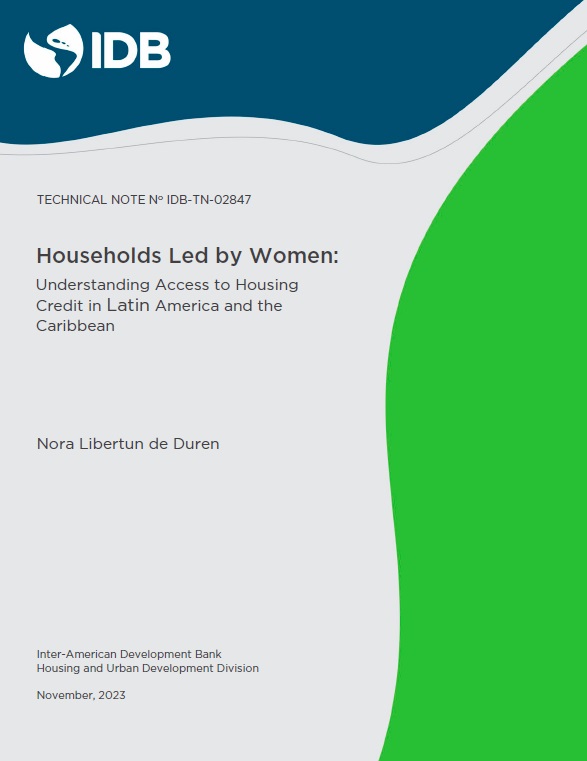Este artículo está también disponible en / This post is also available in: Spanish
Housing is a fundamental human right and a key factor for human development. However, many households in Latin America and the Caribbean (LAC) face difficulty accessing adequate and affordable housing. One of them are those led by women, also known as female-headed households (FHHs). In a FHH, the primary breadwinner and decision-maker is a woman. They are more common than some people may think, as they represent around one in four households in LAC, the highest proportion of FHHs in the world. FHHs are also more likely to experience poverty, social exclusion, and housing deficits than male-headed households (MHHs).
One of the main tools available to improve housing conditions is access to housing credit, as it allows households to buy, build, or renovate their homes. However, access to housing credit is complex, and there is evidence of a gender gap that disadvantages women. For this reason, the IDB´s Housing and Urban Development Division has recently published a paper to analyze whether there is a gender gap in access to housing credit in LAC and its reasons. Would you like to learn more about this? Keep reading to discover some of our findings.
The gender gap in access to housing in Latin America and the Caribbean
To carry out this study, we used data from the Global Findex, a survey that measures how people in 144 countries save, borrow, make payments, and manage financial risk. We focused on the 21 LAC countries included in the survey, and looked at whether people used a loan to purchase a home or an apartment in the past year. We also considered other variables that could influence access to housing credit, such as income, education, savings, employment, and financial inclusion.
Our findings indicate that there is indeed a gender gap in access to housing credit in LAC, which reflects gender gaps in other areas, most notably in labor markets. The research found that, regardless of gender, the average housing credit holder is older, better educated, wealthier, and has more savings and more experience with banking institutions than the average person in LAC. We also found that on average- men have higher levels of income, employment, and savings than women, and that as a consequence, they are more likely to have access to any financial product, including a housing loan.
Another important finding is that, when comparing men and women who hold access to housing credit, women face more constraints to access housing credit than men. For example, we found that women in the second wealthiest quintile have the same access to credit as men in the second poorest quintile, and that women with loans earn wages at almost the same proportion as the average man, and at a rate 60% higher than other women. This suggests that women need higher levels of income and education than men to achieve the same access to financial services, and that they may face discrimination or self-selection when seeking credit.
The gender gap between female vs male head of household
The gender gap in access to housing credit is especially relevant for FHHs, given that they are more likely to live in overcrowded, inadequate, or rented housing, and to spend a higher proportion of their income on housing expenses. FHHs are also more vulnerable to economic shocks, natural disasters, and violence, which can affect their housing security and stability. Therefore, having access to housing credit can be a powerful tool for FHHs to improve their housing conditions and well-being.
However, our study shows that FHHs have lower access to housing credit than MHHs, and that this gap persists even after controlling for observable variables. This means that there are other factors that affect the access to housing credit for FHHs, such as their household composition, preferences, expectations, and constraints. For example, FHHs may have more dependents, such as children or elderly relatives, who require more space and care, but who also reduce their income and savings potential. FHHs may also have different preferences and priorities than MHHs, such as valuing location, security, or community over size or quality. FHHs tend also to have lower financial literacy than MHHs, which limits their credit access.
How to close the gender gap in access to housing credit?
To address the gender gap in access to housing credit in LAC, and to support FHHs in achieving adequate and affordable housing, it is necessary to adopt a comprehensive approach that considers the multiple dimensions and determinants of housing. This approach should include policies and programs that aim to Iincrease the women’s financial inclusion and literacy, by providing them with access to a range of financial products and services that suit their needs and preferences, and by enhancing their knowledge and skills on financial management and decision-making. In addition, it is essential to understand that gender gaps in credit markets reflects those in labor markets and in cultural barriers.
Let´s promote adequate and affordable housing for all!

By closing the gender gap in access to housing credit, and by improving the housing conditions of FHHs, we can contribute to advancing gender equality and women’s empowerment. In addition, we will be also working towards the achievement of the Sustainable Development Goals, especially Goal 5 (Gender Equality), Goal 10 (Reduced Inequalities), and Goal 11 (Sustainable Cities and Communities). Let´s promote adequate and affordable housing for all!


Leave a Reply